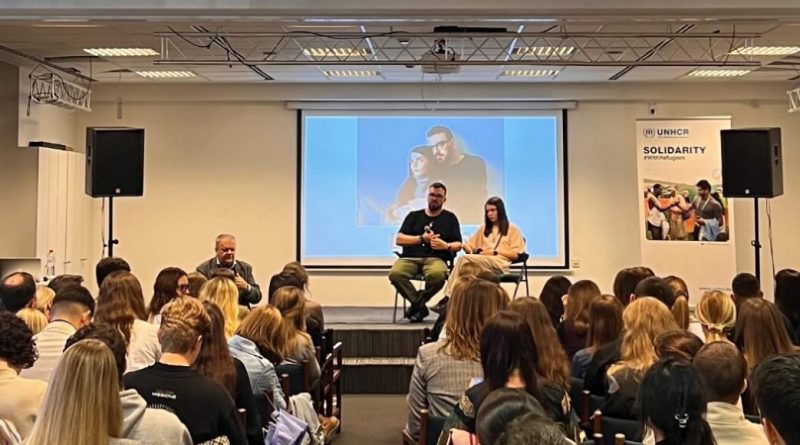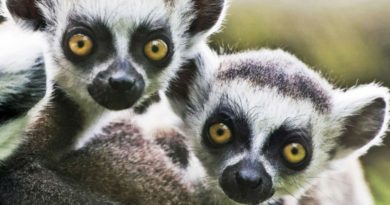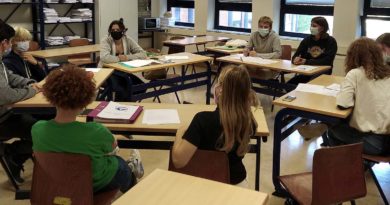War through a lens: Interview with Kostiantyn and Vlada Liberov
Less than a month ago, on October 9th, I was given the opportunity to attend a meeting with Ukrainian documentary photographers Kostyantyn and Vlada Liberov. The event was organized by the Ukrainian Voices Refugee Committee and took place in a question-and-answer format in a friendly atmosphere, even though the subjects discussed were quite complex: the situation on the Ukrainian frontline at the moment, all the difficulties of working as a military photographer, the importance of preserving the memory of fallen Ukrainian soldiers and many more.
Who is the Liberov family?
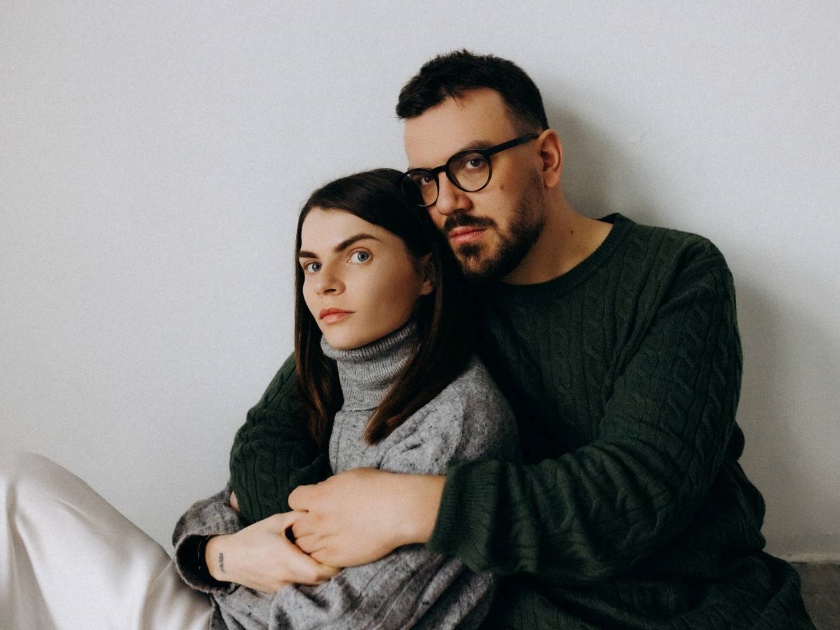
Kostyantyn and Vlada Liberov (also known by the name “Libkos” in social media) are Ukrainian documentary photographers from the Odesa region. They have now been married for seven years and have always worked together in their photographic career. Initially, the Liberov family specialized in romantic photoshoots, but the full-scale invasion of Russia in Ukraine on February 24th completely changed their lives, including their occupation – the couple discovered a new style of photography for themselves. From that point on, they began capturing a new, unusual reality for Ukraine in the conditions of war: destroyed cities, civilians injured by massive shelling, soldiers, fearlessly protecting their homeland. The Liberovs have thousands of photos from the front-line documenting Russia’s crimes on the territory of Ukraine. Some of them had been selected by the Times magazine in the nomination of the 100 best photos of 2022 and 2023. In August 2023, Kostiantyn and Vlada were awarded the Order of Merit of the III degree. At the moment, the couple continues their work and shares their experience both with Ukrainians and with an international audience.
- Since both photographers participated in the discussion, the answers of each of them were marked with the first letters of the interviewees’ names – V for Vlada and K for Kostiantyn Liberov.
It would be very interesting to know which photoshoot you, as famous photographers, find the hardest mentally.
K: We are absolutely ordinary photographers, trying to convey the stories of extraordinary people. The most difficult for us has always been the filming process of the funerals. Through the camera, we try to show the grief of those who have lost their loved ones. But families and other people who value them remain.
В: Death itself is not scary. But what is scary is what happens after death, what relatives and friends feel. It enters through our feelings.
How are you managing to film on the battlefield during the war?
V: To be honest, I’m afraid of FPV-drones [displays a video of a drone almost hitting them on the screen]
This video was taken from a volunteer’s go-pro. It shows the drone hitting an area one meter away from me. At that very time, the drone aimed at an evacuation bus with people inside, which is a violation of the rules of warfare. The appearance of these drones, small and cheap, greatly changed the course of the war. You can run away wherever you want, but they will « see » you and aim at you. With their appearance, it became more frightening to be even near the frontline.
K: When we talk about filming the war, in the zone 5-10 m from the front line it is no longer possible to move around with the camera. This is the reason why we have less data from the front line.
V: We can explain why our protection front is collapsing. The enemy has a lot of manpower, all artillery uses FPV-drones. 2 or 3 hang over them all the time. If something passes or an infantry unit appears, the drone hits immediately. In this way, they [the enemies] control logistics. Even the volunteers transmit packages for the Ukrainian military with FPV-drones, otherwise they are at risk of not coming back alive.
How do you find the strength and motivation to go to the frontline?
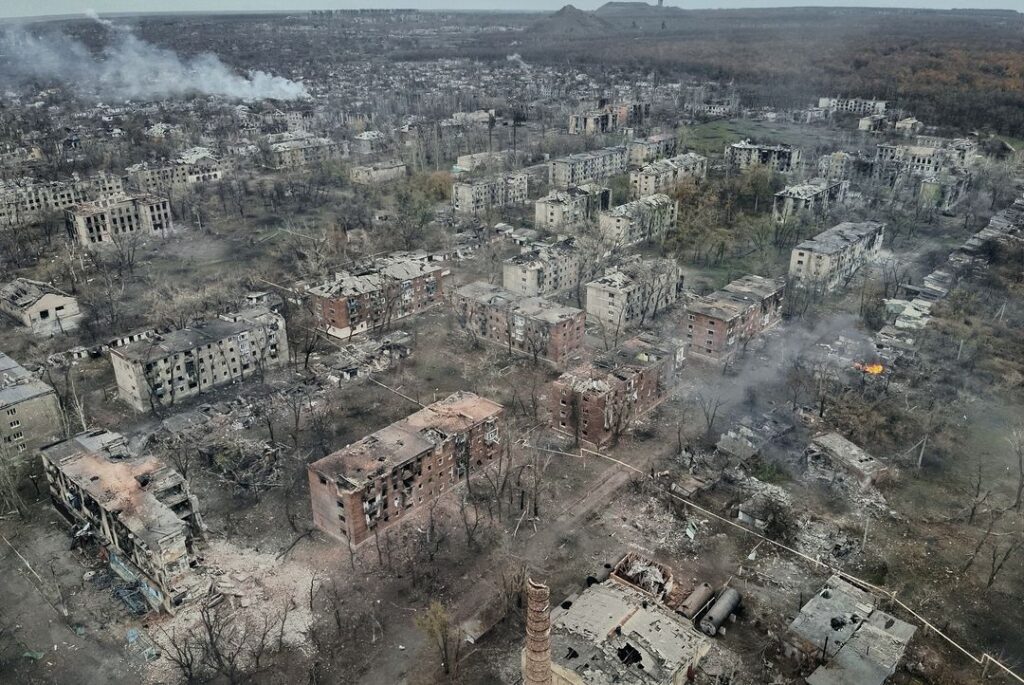
V: Maybe, the reason is that there are two of us. There are crisis situations, where we can support each other. Of course, my fears are not comparable to those of the wives of any military Ukrainians, but I keep living in fear, so it is good that my husband is always there for me and vice versa. On the third year of the full-scale war, it is still important. We passed the stage, where we thought that it would be possible to take photographs to stop the war. Now we just want to make the military visible. It is something so terrible – not to be noticed. We don’t want any soldier in Ukraine to be unseen.
K: When you get a lot of messages, asking such questions, you think “what am I even doing there? Maybe, I should stay in Belgium?”
V: But we have a responsibility for what we are doing in front of the country and even in front of you [referring to the audience].
Do the people in Ukraine still have energy to endure the war?
V: I would like to say that people are still united, but it is not so, and we sometimes ask ourselves if Ukraine can win in the long run. But there are still many people, in fact, the majority, who understand that this war is not just politics. It is because of them that we hold on and continue our work. Otherwise, we would lose not only our physical homes, but our culture as well.
K: Although it is obvious, that the powers are limited and finite.
V: There is still hope. Recently, we made Tuesday the day of donations. We publish verified collections on our Instagram profile, up to ten, but in fact more. People give money very often in very small amounts. Now, when we were sure, that there these collections would not be very successful given the challenges in the Ukrainian economy, we still saw the donations coming in. The response is the same as at the beginning of the full-scale invasion: It is unity. When we are united, even small efforts can make something great. Every Tuesday makes us believe it.
Do your international colleagues ask you about the rationality of giving up the lands? How would you answer that question?
K: All the colleagues we communicate with are very understanding. We can always rely on their good cooperation. When we are asked anything on that topic, we talk about the outcome of giving the whole Europe to Hitler in the WW2. There are many parallels.
What type of memorial should we create to symbolize this war?
V: It is very painful for us to talk about that. There must be no such concept. Irina Tsybukh (Ukrainian public figure, journalist, paramedic who died on the battlefield in Kharkiv Oblast on May 29, 2024) was fascinated by this topic. We were discussing ideas for bringing to action the new projects in our state. Our work was to spread her ideas, but recently she died in this war. Now we understand that she is part of that future memorial. I want it to be something more significant than the ugly plaques at schools. I would make a memorial site that encourages us to stop and feel our emotions.
K: In Ukraine we have memorial site on the Square of Independence. The place is quite significant, but most of it is just plastic and paper, which will turn white by the end of the next year.
V: We hope that there will be concepts that are worthy of attention
K: if we survive this war, after the victory, at the end of it
V: The problem with memorial sites is much more global than we can imagine. Ukraine is forgetting generation to generation. We would like to make something unforgettable.
Speaking of Europe, we are excited about the memory culture that exists here. In some sense, for us it is something that happened a long time ago. There are some memorial sites that make me tear up, even though I understand that this story goes way back. It means that the monument performs its initial aim. In Ukraine, we would also like to have something that would work thirty, forty, fifty years later for people to see it, something that would make them cry.
K: I’m also afraid that the memorialization would just be a plain stone
V: It must be something more significant, something that speaks to people of our generation. We have to convey this message to people.
Are you working on the storage of the data?
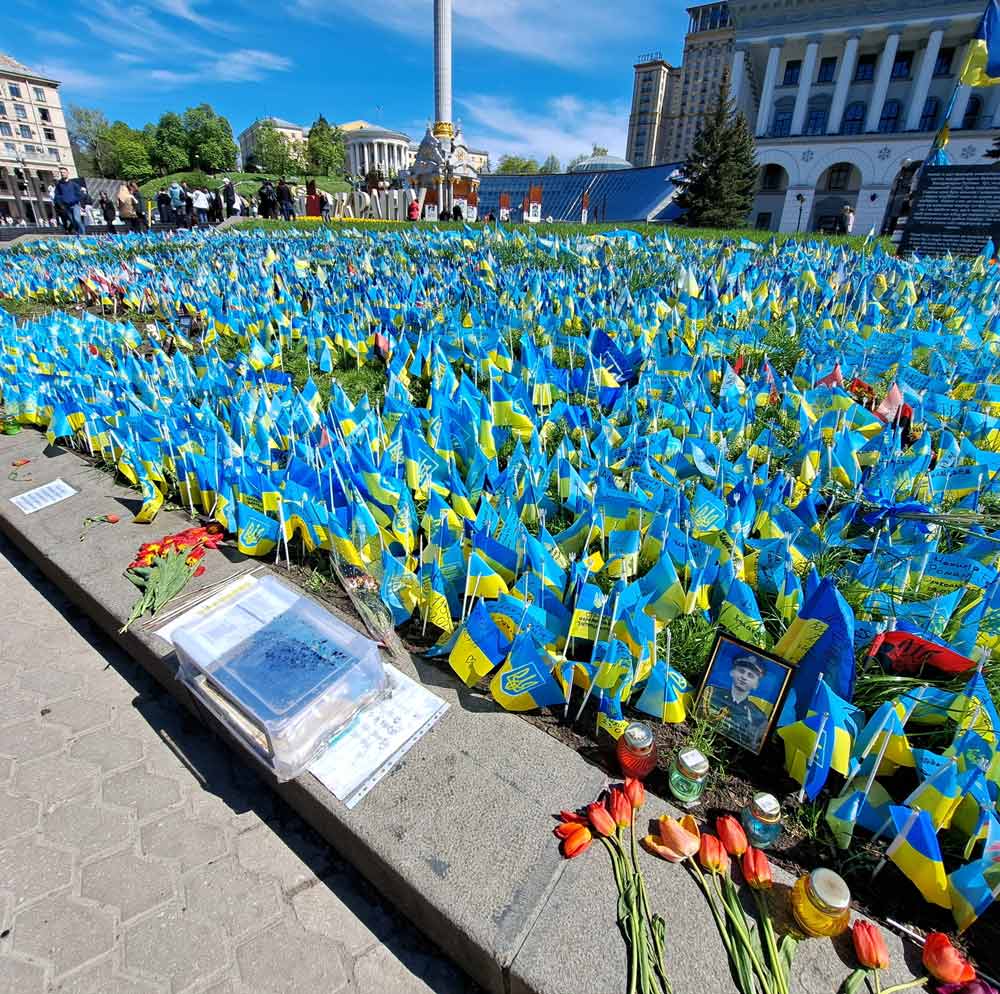
V: I believe it is an automatic process, because we are international journalists, and I hope our photos will be used. We are dreaming about providing pictures for this reason.
K: We always send the pictures to the international organizations when they ask for it and are happy to do that.
Do you have any rituals that help you recover your mental health after coming back home? What do you do to relax?
V: Antidepressants. I’m not even joking. Also, for the last half a year we have started to walk a lot. Kostia [short for Kostiantyn] packs bags. He watches tutorials on how to pack bags correctly. What helps us the most are psychiatrists, psychotherapists and long walks.
K: We’re here for two weeks and a change of environment is also therapy for us
Do you have any pictures at home?
K: It might be surprising, but we don’t have any pictures at home, only two paintings of Ukrainian artists.
V: Maybe, the reason for that is that we are not at home that often. We haven’t been there since the 11th of September.
Would you mind talking about the paintings in more detail? What artist’s works are they? Can you also tell us if you have a favorite photograph?
V: Both artists, Artur Soletskyi and Lyudmyla Davydenko, are from Lviv.
It is also very interesting that both pictures depict two people. As a couple, we might have chosen them unconsciously
K: If we talk about photographers we like, these are definitely Robert Kappa and Elliot Erwitt. The photographers took completely different pictures. We have seen Erwitt’s exhibition here, in Brussels and spent an hour looking at his works. It was a pleasure to look at these excellent photographs and I hope we will also be able to take such pictures someday.
What would you do if you imagine that the war ended in Ukraine?
V: We have already had a similar experience, when Kherson was freed. Back then we had both celebrated and took photographs. While taking pictures, I didn’t even notice that I started singing and realized that only later. I believe that when the victory comes it will be the same.
You have seen prisoners from Azov and other places. What were the stories that impressed you the most? What can people do to help?
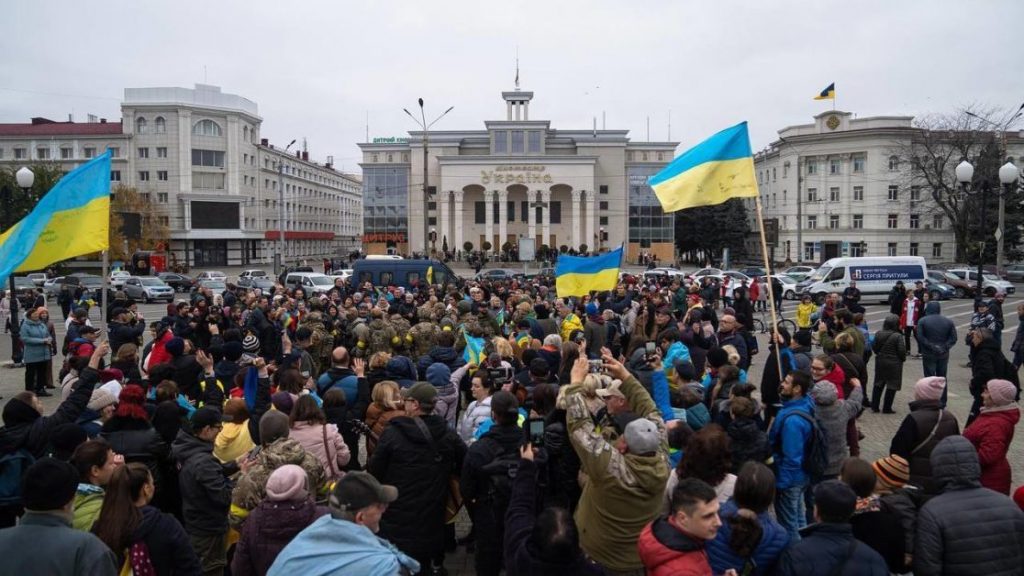
V: We are probably the only Ukrainian photographers who take photos of Ukrainian prisoners coming out of the Russian colonies and it is very difficult psychologically. You see the people who had been starved. You see people with ulcers on their feet. They [Russian guards] make them stand for 20 hours every day. Although the situations are different, as well, as the relation of the Russians towards the imprisoned soldiers, all of them come back exhausted and starved. Some of them have lost 20 kg, and others, even 50kg. They were told that Russia would invade Ukraine completely and move its forces towards Poland. It is hard for me to talk about it. It is hard to see the pictures of how our soldiers looked before. Physical abuse is obvious, but what I can see in their eyes really breaks me down. They live without any information. They are being lied to; they don’t know the news. Their exchange is a very happy moment. Most of them had situations when they were put in the bus, told that they were going to be exchanged and eventually arrived at the other colony, where they were treated even worse than before. These people lose their trust and when they return, they actually kiss the land. We hope that all of them will come back home one day.
K: Also, we don’t understand where the cruelty is coming from
V: Each week there are demonstrations in Ukraine, where we are shouting about bringing back our soldiers. But here it is even more important to show your voice. It is not normal that in the 21st century this is still happening. Imprisonment is a slow death. I believe many of you have seen pictures where the soldiers are coming back in coffins, looking like mummies. We must shout that thousands of them are still in imprisonment.
K: Thank you to those who already do it. One voice from Europe is a huge contradiction to the Russian propaganda.
Thank you all for coming.
V: The presence of each of you here is very important. It means a lot to us.
A final word
EURSCMAG editor team is grateful to Kostyantyn and Vlada Liberov for the opportunity to touch upon the topics of such importance and discover the work of a documentary photographer from different perspectives. We look forward to their next visit to Brussels, by which the war on the territory of Ukraine will, hopefully, be over and each of its habitants will be able to return to their normal, peaceful life. The pictures taken by the couple will forever remain a reminder of the perseverance of the Ukrainian people. The activities of the Liberov family largely prove that the documentation of the war is extremely important both for Ukraine and for the entire civilized world. It is thanks to such courageous and dedicated people, that humanity will remember the crimes, committed hopefully be able to prevent them in the future. Sofiia MAKARUKHA / S6ENB / EEB1

